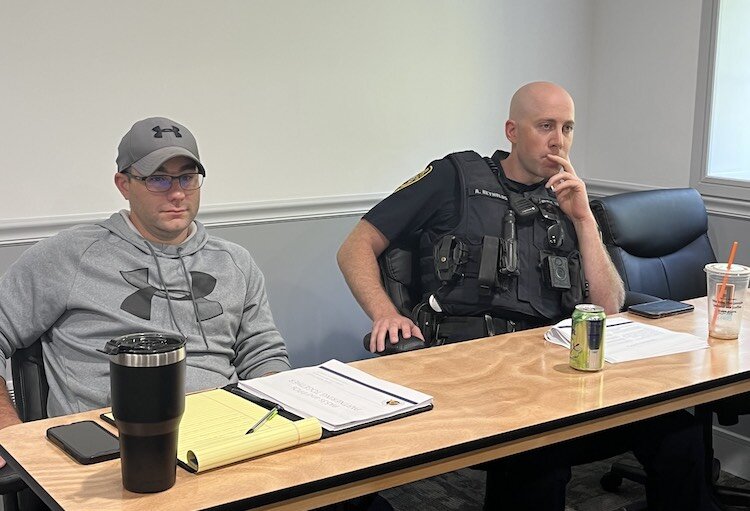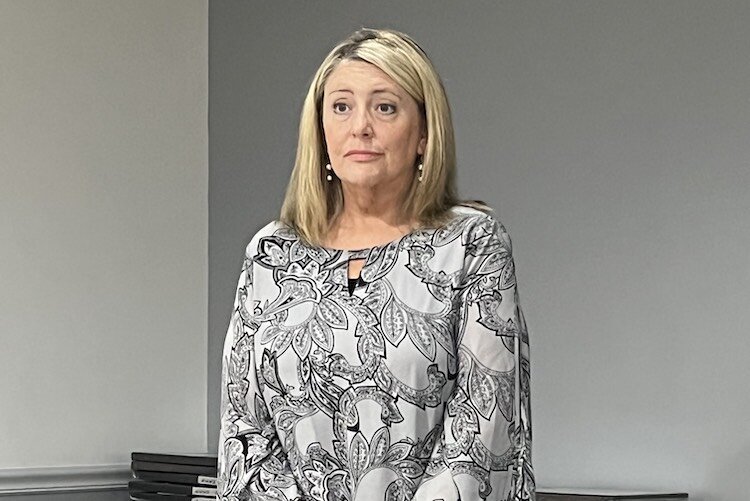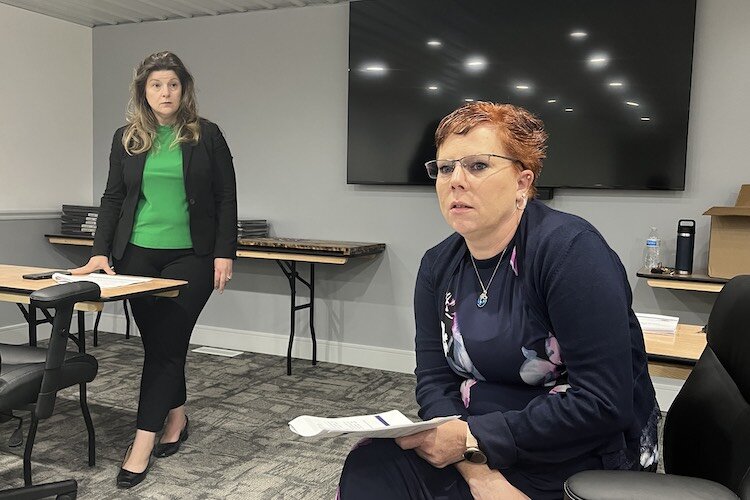Personal Protection Orders: Calhoun County judges meet with police to clarify policies
In 2022, there were 692 Personal Protection Orders applied for in Calhoun County, the most since 2012. The terms of PPOs are wide-ranging and can cause confusion — so a couple of Calhoun County Judges are meeting with police officers around the county to help educate so they are better prepared.
Editor’s note: This story is part of Southwest Michigan Second Wave’s On the Ground Calhoun County series.
Technology is expediting the process of applying for Personal Protection Orders in Calhoun County. However, local law enforcement officials aren’t always up to speed on changes surrounding those PPOs.
As a way to better inform and educate the police officers who routinely come into contact with county residents seeking those PPOs, District Court Judge Tracie Tomak and Circuit Court Judge Tina Yost since March have been making presentations to area law enforcement agencies to ensure that their officers are better prepared. In addition to conversations about PPOs, the judges have been discussing the differences between PPOs and PA53s.
In addition to presenting in Albion, they have made similar presentations to officers with police departments in the City of Battle Creek, Emmett Township, and the City of Marshall.
“We are trying to make sure we’re working as collaborative teams and all agencies are working together to make your jobs easier, especially if you know what prosecutors and judges are looking for,” said Yost to a group of Albion Public Safety Officers and others during a recent presentation.
There is a commitment to bring a unified message of “how we can help you in the field and bring that team together?” County Clerk Kimberly Hinkley told those in the room.

In 2022, there were 692 PPOs applied for in Calhoun County. Tomak and Yost say that this is the largest number of PPOs applied for since 2012. Of those applied for, 452 were granted.
Laura Reichow, Calhoun County PPO Coordinator, says she’s not sure what led to the increase in people seeking PPOs.
“I don’t know if it’s the availability of PPOs and people becoming more aware that it’s a process and they don’t have to deal with behaviors that put them at risk,” says Reichow who is not the County’s only PPO Coordinator.
These behaviors, she says, are getting worse. “It’s a societywide issue.”
In her role as the County’s only PPO Coordinator, Reichow helps people navigate the PPO process such as filling out the paperwork or letting them know what to expect. She assists both the petitioner and the respondent.
As requests for PPOs are coming in, Yost says that the feedback she is receiving indicates that there is some confusion between the use of these orders and PA53s.
A PA53 is a bond condition set at an arraignment. It is a NO contact or “non-assaultive” contact condition attached to the Bond on ALL Domestic Violence and other personally assaultive cases, according to information provided by Tomak and Yost. During the arraignment, the Court provides the defendant with a detailed description of what “No Contact” means which includes no phone calls, text messages, emails, or social media comments about the victim.
A PPO is a court order that prohibits an individual from contacting or coming within a certain distance of another individual, according to Michigan Defense Law. A PPO may prohibit the respondent from placing or delivering an object to property owned, leased, or occupied by the petitioner; entering onto or remaining on the leased or owned property; or appearing at the workplace or residence of the petitioner.

In the information handout provided to officers, Tomak and Yost say in all capital letters — “Yes, we can and do make people move!”
There has been ongoing movement among service teams and coordinators, the County Prosecutor’s Office, the County Clerk’s Office, and judges to meet and collaborate to better serve the public, Yost says.
“There was a lot as far as some of the clarifications and some of the wording,” says Dan Riley, an Albion Public Safety Officer, about what he took away from the meeting titled “PA53s and PPOs Partnering Together.”
He recounted a recent call for service that involved two neighbors who were feuding.
One of the neighbors, he says, had a no-contact order which is a court order that prohibits contact between a defendant and a victim or witness in a criminal case,
The neighbor with the order tried to tell Riley that it also included visual contact with his neighbor.
“It does not mean coming into sight,” Riley says. “The perpetrator would pull into his driveway and go right into his house. The guy who filed the order would actually sit in his front yard and say that the neighbor violated the order.”
These particular calls for service require the attention of officers, but they also divert attention away from more critical calls for assistance, especially those involving the endangerment of someone’s life. The officers in the room nodded their heads as a fellow officer talked about answering repeated calls for service at a particular residence. They were all familiar with the individuals involved and the ongoing cycle of the complaints involved.
“I can’t understand what it must be like to go to the same place over and over again,” Tomak says. “It’s the same at S.A.F.E. Place where you’ve got the same people coming in again and again. You can’t force them to do anything. You just hope they change their minds.”
“You do have your recurring calls and if someone calls for help, I’m still going to go,” Riley says.
The most dangerous calls
The calls for service that put officers most on guard are those involving domestic relationships or traffic stops. Riley says these are the two most dangerous and Tomak says the former is the one crime predictor of a homicide.
“A lot of its domestics. We do have some feuding neighbors and there’s usually some sort of relationship. They know each other and may have attended school together or are neighbors,” he says.
Despite more of a focus on domestic assault issues and the many resources available, Reichow says less than 20 percent of those who are assaulted press charges or file for a PPO.
“They’re stuck in a cycle of trying to survive and maintain day-to-day operations and they’re not going to seek out and fill out paperwork,” she says. “There’s this mentality that if you’ve been abused for that long it does take some time to regain your footing and stand on solid ground and not have your abuser still in your head dictating your actions.”

Without a clear understanding of the wording outlining PPOs and PA53s, Riley says it’s challenging for the victim and the officer.
“If the wording is not known to us or new to us, the clarification can be hard,” he says. “There “There are thousands of different PPOs put in place. I have seen them as little restraint or restrictions, as non-assaultive contact all the way to you can’t even drive down that street.”
The training police recruits receive at a Police Academy is basic training to prepare them for a full-time job. Each officer takes more training depending on what direction they want to go in — be it a supervisory role or working as a detective. But with continual changes and updates to laws like those governing PPOs, Riley says he and his fellow officers need to learn about them to be more efficient in their jobs.
“We have in Calhoun County, a lot of new faces for law enforcement so when the older ones retire they take away that knowledge,” Reichow says. “To my understanding, this type of training has never been considered in Calhoun County.”
Still, she says the Albion training helps to develop a greater sensitivity and understanding between the victims and responding officers of what each goes through when situations escalate.
Riley says the discussion with Tomak, Yost, and others gathered gave him a better understanding of some of the meanings of words used and the encouragement to make an arrest “if at all possible.”
When an arrest is being made, Yost cautioned officers against telling the victim to apply for a PPO.
“They assume if an officer tells them to apply, they’ll automatically get one,” she says. “You can ask what their plan is and if they’ve considered a PPO. You can’t give them legal advice.”
Hinkley developed a business card for Reichow that has her direct dial number, her email address, and a QR code to reduce the time officers spend answering questions that may be outside of their main job. This direct access provides victims with the opportunity to fill out paperwork without having to travel within the county.
Oftentimes County Prosecutor Dave Gilbert and his team can offer resources including counseling classes, interventions, or healthy relationship counseling, Tomak says. She was the driving force behind the effort to create the county’s Domestic Violence Intervention Court.
The two judges say they will do whatever it takes and meet officers wherever they are to offer clarification and support.
“We read your reports and want you to know that your input is critical to the decisions we make,” Tomak said to the officers.
















